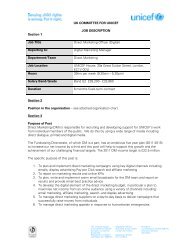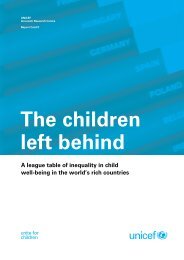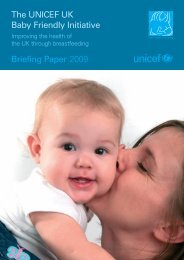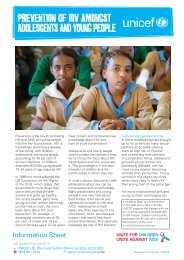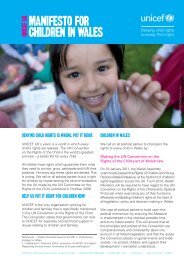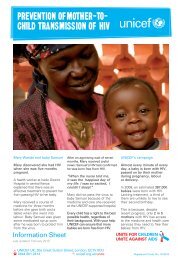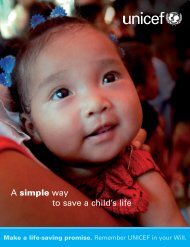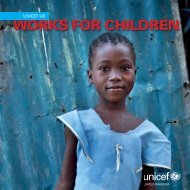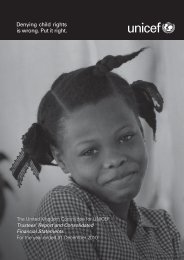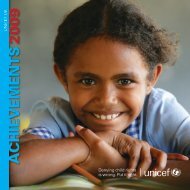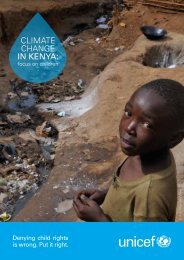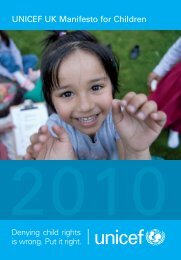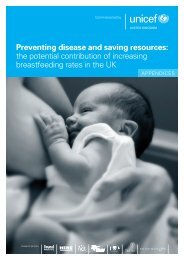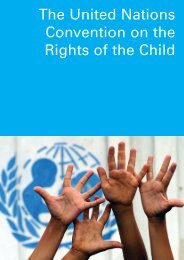short version of the report for young people - Unicef UK
short version of the report for young people - Unicef UK
short version of the report for young people - Unicef UK
Create successful ePaper yourself
Turn your PDF publications into a flip-book with our unique Google optimized e-Paper software.
The well-being <strong>of</strong> children:<br />
how does <strong>the</strong> <strong>UK</strong> score?<br />
REPORT CARD 11<br />
On a scale <strong>of</strong> one to ten, how satisfied do you feel<br />
with your life? Has anybody asked you that<br />
question be<strong>for</strong>e? Have you ever thought about your<br />
own well-being and happiness as a <strong>young</strong> person<br />
growing up in <strong>the</strong> United Kingdom in <strong>the</strong> twentyfirst<br />
century?<br />
Do you have enough money to do <strong>the</strong> things you want<br />
to do – like swimming or playing a musical instrument?<br />
Do you eat three meals a day – including breakfast? Do<br />
you have somewhere quiet to do your homework? How<br />
much exercise do you do every day? Have you ever<br />
been bullied? Do you feel safe where you live? Do you<br />
have <strong>the</strong> chance to invite your friends round to your<br />
house to play from time to time? And how easy is it to<br />
talk to your mum or dad – or to your school friends?<br />
In 2007 UNICEF, <strong>the</strong> world’s leading organisation <strong>for</strong><br />
children and children’s rights, published a groundbreaking<br />
study looking at <strong>the</strong> well-being <strong>of</strong> children and<br />
<strong>young</strong> <strong>people</strong> in some <strong>of</strong> <strong>the</strong> world’s richest countries.<br />
Researchers asked lots <strong>of</strong> probing questions that<br />
compared life <strong>for</strong> children in 21 different countries –<br />
from Poland to <strong>the</strong> United States.<br />
Shockingly, <strong>the</strong> United Kingdom was bottom <strong>of</strong><br />
<strong>the</strong> league table. It turned out that children and<br />
<strong>young</strong> <strong>people</strong> in Britain were among <strong>the</strong><br />
unhappiest, unhealthiest, poorest and least<br />
educated in <strong>the</strong> developed world in <strong>the</strong> early years<br />
<strong>of</strong> <strong>the</strong> new millennium.<br />
The findings were a big wake-up call <strong>for</strong> adults in this<br />
country – especially <strong>for</strong> <strong>the</strong> <strong>people</strong> and organisations<br />
that are responsible <strong>for</strong> <strong>the</strong> well-being <strong>of</strong> our children<br />
and <strong>young</strong> <strong>people</strong>.<br />
Children and <strong>young</strong> <strong>people</strong> in <strong>the</strong> 2000s<br />
Six years on, UNICEF has published ano<strong>the</strong>r study<br />
comparing <strong>the</strong> well-being <strong>of</strong> children and <strong>young</strong> <strong>people</strong><br />
across 29 countries – and looking at whe<strong>the</strong>r children’s<br />
lives have improved at all in <strong>the</strong> original list <strong>of</strong> 21<br />
countries since <strong>the</strong> first study took place.<br />
The good news is that <strong>the</strong> United Kingdom fared much<br />
better this time around. Instead <strong>of</strong> ending up at <strong>the</strong><br />
bottom <strong>of</strong> <strong>the</strong> pile, we ranked 16th out <strong>of</strong> <strong>the</strong> world’s<br />
richest 29 countries. And 86 per cent <strong>of</strong> children living<br />
in <strong>the</strong> <strong>UK</strong> <strong>report</strong>ed a high level <strong>of</strong> life satisfaction.<br />
They looked at things like child poverty, health,<br />
education, where children lived and <strong>the</strong>ir safety. They<br />
also looked at risk factors like violence, smoking, alcohol<br />
and drugs that can affect how children live <strong>the</strong>ir lives.<br />
unicef.org.uk/rc11<br />
UNICEF <strong>UK</strong><br />
REPORT CARD 11<br />
On <strong>the</strong> well-being <strong>of</strong> children: how does <strong>the</strong> <strong>UK</strong> score? 1
But <strong>the</strong>re is still a long way to go be<strong>for</strong>e we can<br />
give ourselves a pat on <strong>the</strong> back:<br />
• The <strong>UK</strong> still has <strong>the</strong> lowest rate <strong>of</strong> <strong>young</strong> <strong>people</strong><br />
going into fur<strong>the</strong>r education among <strong>the</strong> countries<br />
in <strong>the</strong> study. The proportion <strong>of</strong> <strong>young</strong> <strong>people</strong> age<br />
15 to 19 enrolled in schools and colleges is more<br />
than 80% in every major developed nation, except<br />
<strong>the</strong> <strong>UK</strong> where <strong>the</strong> rate is just 74%.<br />
• We were placed in <strong>the</strong> bottom third <strong>of</strong> <strong>the</strong> infant<br />
mortality league table. The <strong>UK</strong> death rate <strong>of</strong><br />
infants under <strong>the</strong> age <strong>of</strong> 1 is approximately double<br />
<strong>the</strong> rate <strong>of</strong> Sweden or Finland.<br />
• We are one <strong>of</strong> only three rich countries with a<br />
teenage pregnancy rate <strong>of</strong> more than 30 per<br />
1,000. The <strong>UK</strong> is also one <strong>of</strong> only three countries<br />
where <strong>the</strong> rate <strong>of</strong> teenage births has not fallen<br />
over <strong>the</strong> first decade <strong>of</strong> <strong>the</strong> 2000s. This finding is<br />
particularly significant because <strong>the</strong> <strong>UK</strong>’s teenage<br />
pregnancy rate was already <strong>the</strong> highest in Europe<br />
at <strong>the</strong> beginning <strong>of</strong> <strong>the</strong> millennium.)<br />
• And we have one <strong>of</strong> <strong>the</strong> highest alcohol abuse<br />
rates by <strong>young</strong> <strong>people</strong>. Around one in five children<br />
in <strong>the</strong> <strong>UK</strong> age 11 to 15 <strong>report</strong> having been drunk<br />
on at least two occasions.<br />
Some <strong>of</strong> <strong>the</strong>se statistics<br />
inevitably focus attention on <strong>the</strong><br />
negative behaviours <strong>of</strong> <strong>young</strong><br />
<strong>people</strong>. But in almost all cases,<br />
<strong>the</strong>se behaviours involve only a<br />
small minority <strong>of</strong> children and<br />
<strong>young</strong> <strong>people</strong>. The same data<br />
can also be used to show <strong>the</strong><br />
good news that across <strong>the</strong><br />
world’s richest countries:<br />
But it’s not all bad news:<br />
• We have one <strong>of</strong> <strong>the</strong> lowest rates <strong>of</strong> child<br />
deprivation in <strong>the</strong> developed world. Which<br />
means that children in <strong>the</strong> <strong>UK</strong> generally have <strong>the</strong><br />
material things <strong>the</strong>y need to enjoy life – including<br />
at least one meal a day with meat, chicken, fish (or<br />
a vegetarian equivalent); enough money to join in<br />
with school trips and events; <strong>the</strong> chance to take<br />
part in regular leisure activities like swimming;<br />
access to an internet connection; and two pairs <strong>of</strong><br />
shoes that fit properly.<br />
• We are one <strong>of</strong> only four rich countries to see a<br />
drop in <strong>the</strong> percentage <strong>of</strong> overweight children<br />
in <strong>the</strong> first decade <strong>of</strong> <strong>the</strong> new millennium (<strong>the</strong><br />
o<strong>the</strong>rs being Belgium, France and Spain).<br />
• We have one <strong>of</strong> <strong>the</strong> lowest children’s cigarette<br />
smoking rates in <strong>the</strong> rich world. The <strong>UK</strong> is also<br />
one <strong>of</strong> only four countries that have more than<br />
halved <strong>the</strong> proportion <strong>of</strong> <strong>young</strong> <strong>people</strong> who smoke<br />
cigarettes over <strong>the</strong> first 10 years <strong>of</strong> <strong>the</strong> 21st century<br />
It’s not all bad news<br />
» 99% <strong>of</strong> girls don’t get pregnant while still a teenager<br />
» 92% <strong>of</strong> children don’t smoke cigarettes<br />
» 85% <strong>of</strong> children aren’t overweight<br />
» 86% don’t use <strong>the</strong> drug cannabis<br />
» 85% don’t get drunk<br />
» about two thirds are nei<strong>the</strong>r bullied nor involved in fighting.<br />
unicef.org.uk/rc11<br />
UNICEF <strong>UK</strong><br />
REPORT CARD 11<br />
On <strong>the</strong> well-being <strong>of</strong> children: how does <strong>the</strong> <strong>UK</strong> score? 2
How does <strong>the</strong> <strong>UK</strong> compare with o<strong>the</strong>r countries?<br />
Key findings<br />
Overall well-being Dimension 1 Dimension 2 Dimension 3 Dimension 4 Dimension 5<br />
Average rank<br />
(all 5 dimensions)<br />
Material<br />
well-being<br />
Health and safety Education Behaviours and<br />
risks<br />
Housing and<br />
environment<br />
(rank) (rank) (rank) (rank) (rank)<br />
1 Ne<strong>the</strong>rlands 2.4 1 5 1 1 4<br />
2 Norway 4.6 3 7 6 4 3<br />
3 Iceland 5 4 1 10 3 7<br />
4 Finland 5.4 2 3 4 12 6<br />
5 Sweden 6.2 5 2 11 5 8<br />
6 Germany 9 11 12 3 6 13<br />
7 Luxembourg 9.2 6 4 22 9 5<br />
8 Switzerland 9.6 9 11 16 11 1<br />
9 Belgium 11.2 13 13 2 14 14<br />
10 Ireland 11.6 17 15 17 7 2<br />
11 Denmark 11.8 12 23 7 2 15<br />
12 Slovenia 12 8 6 5 21 20<br />
13 France 12.8 10 10 15 13 16<br />
14 Czech Republic 15.2 16 8 12 22 18<br />
15 Portugal 15.6 21 14 18 8 17<br />
16 United Kingdom 15.8 14 16 24 15 10<br />
17 Canada 16.6 15 27 14 16 11<br />
18 Austria 17 7 26 23 17 12<br />
19 Spain 17.6 24 9 26 20 9<br />
20 Hungary 18.4 18 20 8 24 22<br />
21 Poland 18.8 22 18 9 19 26<br />
22 Italy 19.2 23 17 25 10 21<br />
23 Estonia 20.8 19 22 13 26 24<br />
23 Slovakia 20.8 25 21 21 18 19<br />
25 Greece 23.4 20 19 28 25 25<br />
26 United States 24.8 26 25 27 23 23<br />
27 Lithuania 25.2 27 24 19 29 27<br />
28 Latvia 26.4 28 28 20 28 28<br />
29 Romania 28.6 29 29 29 27 29<br />
If you’re looking <strong>for</strong> <strong>the</strong> best place to grow up,<br />
head <strong>for</strong> The Ne<strong>the</strong>rlands – top <strong>of</strong> <strong>the</strong> league<br />
in child well-being among <strong>the</strong> world’s richest<br />
countries. The Ne<strong>the</strong>rlands is <strong>the</strong> only country<br />
ranked among <strong>the</strong> top five rich nations in all five<br />
dimensions <strong>of</strong> child well-being that were measured<br />
in <strong>the</strong> study:<br />
• wealth<br />
• health and safety<br />
• education<br />
• behaviour and risks<br />
• housing and environment.<br />
Four Nordic countries (Finland, Iceland, Norway and<br />
Sweden) sit just below The Ne<strong>the</strong>rlands at <strong>the</strong> top<br />
<strong>of</strong> <strong>the</strong> table.<br />
unicef.org.uk/rc11<br />
The bottom four places in <strong>the</strong> table are occupied by<br />
three <strong>of</strong> <strong>the</strong> poorest countries in <strong>the</strong> survey (Latvia,<br />
Lithuania and Romania) and by one <strong>of</strong> <strong>the</strong> richest<br />
(<strong>the</strong> United States).<br />
You can see how <strong>the</strong> <strong>UK</strong> compares to o<strong>the</strong>r rich<br />
countries in this table, which ranks <strong>the</strong> 29 countries<br />
according to <strong>the</strong> overall well-being <strong>of</strong> <strong>the</strong>ir children.<br />
Do you see anything that surprises you? Are you<br />
surprised to see that countries like Portugal and<br />
Ireland are higher up <strong>the</strong> league table than <strong>the</strong> <strong>UK</strong>?<br />
Or that <strong>the</strong> United States is almost at <strong>the</strong> bottom<br />
<strong>of</strong> <strong>the</strong> table?<br />
In fact, <strong>the</strong>re doesn’t appear to be a strong<br />
relationship between <strong>the</strong> comparative wealth <strong>of</strong> a<br />
country and overall child well-being – <strong>the</strong> wealth <strong>of</strong><br />
UNICEF <strong>UK</strong><br />
REPORT CARD 11<br />
On <strong>the</strong> well-being <strong>of</strong> children: how does <strong>the</strong> <strong>UK</strong> score? 3
a country doesn’t always lead to happier and<br />
healthier children.<br />
Why do you think that might be? What is it that<br />
makes you feel most satisfied with your life?<br />
Overall, <strong>the</strong>re has been widespread improvement<br />
in most indicators <strong>of</strong> child well-being since <strong>the</strong> first<br />
study took place – in particular, in terms <strong>of</strong> family<br />
wealth, child death rates, and smoking among<br />
children. Enrolment rates in fur<strong>the</strong>r education have<br />
increased in most nations too, and <strong>the</strong> great majority<br />
<strong>of</strong> countries have also seen declines in teenage birth<br />
rates, cannabis use, fighting and bullying. Around half<br />
<strong>of</strong> <strong>the</strong> countries in <strong>the</strong> study showed an increase in<br />
children’s overall life satisfaction.<br />
However, against this backdrop <strong>of</strong> steady<br />
improvement, researchers warn that this progress<br />
may have been halted or even thrown into reverse<br />
by <strong>the</strong> widespread economic recession that began<br />
in 2008. The statistics ga<strong>the</strong>red <strong>for</strong> this <strong>report</strong> reflect<br />
<strong>the</strong> beginning <strong>of</strong> <strong>the</strong> economic downturn but not its<br />
full consequences.<br />
Over <strong>the</strong> last three years, many <strong>of</strong> <strong>the</strong> world’s richest<br />
countries have seen fur<strong>the</strong>r rises in unemployment and<br />
falling incomes, as well as cuts in government services<br />
that some <strong>of</strong> <strong>the</strong> poorest families rely on most.<br />
The Report Card series<br />
UNICEF produces <strong>the</strong> Report Card series to<br />
encourage <strong>the</strong> monitoring <strong>of</strong> children’s wellbeing,<br />
to allow us to compare <strong>the</strong> achievements <strong>of</strong><br />
different countries, and to stimulate debate and <strong>the</strong><br />
development <strong>of</strong> policies to improve children’s lives.<br />
About UNICEF<br />
UNICEF is <strong>the</strong> world’s leading organisation<br />
working <strong>for</strong> children. We work with children,<br />
families, local communities, organisations and<br />
governments in more than 190 countries to help<br />
every child realise <strong>the</strong>ir full potential. In everything<br />
we do, <strong>the</strong> most disadvantaged children and <strong>the</strong><br />
countries in greatest need have priority.<br />
UNICEF <strong>UK</strong> raises funds <strong>for</strong> UNICEF’s emergency<br />
and development work around <strong>the</strong> world<br />
and advocates <strong>for</strong> lasting change <strong>for</strong> children<br />
worldwide. This includes, <strong>for</strong> example, working<br />
to change government policies and practices that<br />
restrict child rights in <strong>the</strong> <strong>UK</strong> and internationally.<br />
This is likely to have a pr<strong>of</strong>ound impact on<br />
child well-being over <strong>the</strong> coming years. UNICEF <strong>UK</strong><br />
is campaigning on behalf <strong>of</strong> children and children’s<br />
rights in <strong>the</strong> <strong>UK</strong> to make sure that what money<br />
is available is spent wisely on children and<br />
children’s services.<br />
UNICEF believes that <strong>the</strong> potential impact on<br />
children and <strong>young</strong> <strong>people</strong> should be one <strong>of</strong> <strong>the</strong><br />
first considerations be<strong>for</strong>e decisions are made to<br />
cut services. We think that children’s rights should<br />
be given priority – and that one government<br />
department should be given oversight <strong>of</strong> policies<br />
affecting children and <strong>young</strong> <strong>people</strong>. Goverments<br />
should be asking children regularly how <strong>the</strong>y feel<br />
about <strong>the</strong>ir lives. And Goverments should focus<br />
on helping <strong>the</strong> poorest children at this time <strong>of</strong><br />
great financial pressure on families.<br />
What do you think?<br />
Let us know<br />
unicef.uk<br />
@unicef_uk<br />
unicef.org.uk/rc11<br />
UNICEF <strong>UK</strong><br />
REPORT CARD 11<br />
On <strong>the</strong> well-being <strong>of</strong> children: how does <strong>the</strong> <strong>UK</strong> score? 4



